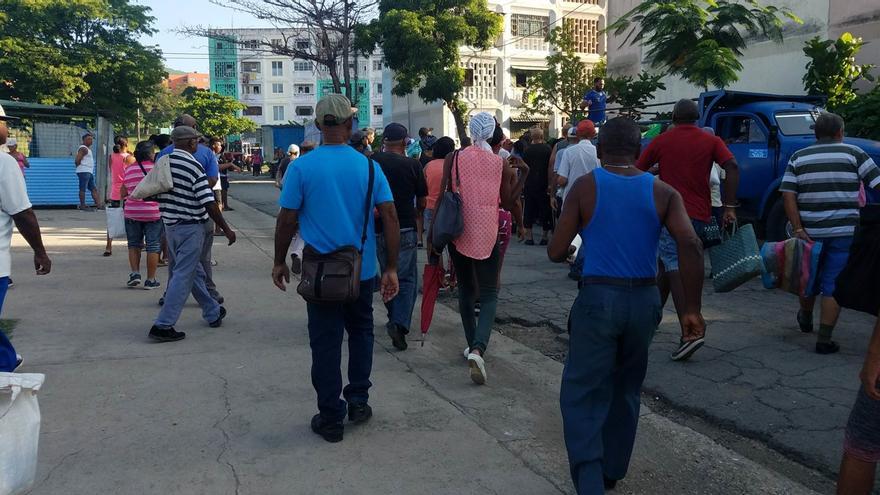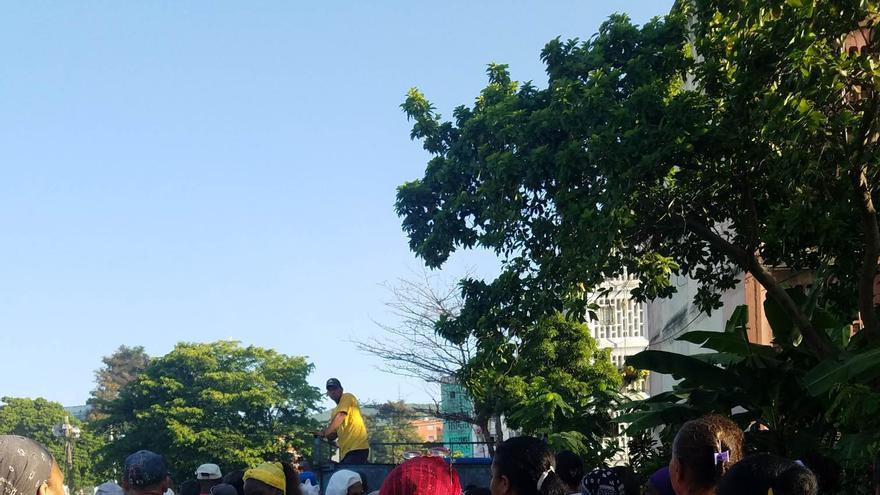
![]() 14ymedio, Santiago de Cuba, 14 October 2023 — It’s early morning, and Yésica puts on her most comfortable clothes and shoes. Together with her two children, she tries to be among the first to buy ’burro bananas’ (fongo, in the east of the country) and yucca at the agricultural fair that takes place every Saturday in the Micro 9 neighborhood, in the José Martí District of Santiago de Cuba. She anxiously waits for the truck to arrive with the products so “the bananas don’t turn black during the week,” but her plan is one thing, and the result could be another.
14ymedio, Santiago de Cuba, 14 October 2023 — It’s early morning, and Yésica puts on her most comfortable clothes and shoes. Together with her two children, she tries to be among the first to buy ’burro bananas’ (fongo, in the east of the country) and yucca at the agricultural fair that takes place every Saturday in the Micro 9 neighborhood, in the José Martí District of Santiago de Cuba. She anxiously waits for the truck to arrive with the products so “the bananas don’t turn black during the week,” but her plan is one thing, and the result could be another.
“People run after the truck, willing to be dragged. If they don’t die of hunger they can die by being crushed,” complains Yésica. To reach the vehicle, still running, position yourself and be among the first customers, “you have to be ninjas,” she says, although in her case, as in that of so many others who come to the fair, “the instinct for survival is stronger than the fear.”
Organized by the city authorities, the fair is not peaceful, and the police often intervene, as happened this Saturday. The relatively low price of food, cheaper than in the private shops, causes an unstoppable flood of people. Both a pound of fongo and one of cassava costs 15 pesos, in contrast to the 80 that they ask for in the private shops. Both products have become the salvation of many homes in the area.
That food is essential to occupy the space that cannot be filled by the scarce five pounds of rice that are distributed through the ration book. That amount is barely enough for a few days, and Yésica says that she can’t always buy the product at 200 pesos a pound, which is the current price in the informal market.
“I bring my children to the fair, and we buy yucca and fongo for 15 pesos. That helps us stretch the little bit of rice they give us,” explains Yésica. “And we even have breakfast with that. If there is no bread, I fry yucca for the kids in the morning and let them fill up with it because sometimes I can’t buy bread. I need at least six rolls a day, and that’s where 150 pesos go.”
Physical skill, youth and some craftiness are essential to fill the bag. Last Saturday, the son of this santiaguera, 16 years old, got a good place on the moving vehicle, and “I got a place nearby, like the 15th.” Every Saturday you can see people rushing to get in line and run behind the truck. There are also people on crutches, mothers carrying small children and the elderly.
“That day, although my son managed to be among the first, I didn’t get home until noon, and that’s why they do a nearby fair,” Yésica adds, referring to others in various parts of the city, but because of “how bad the transport is, it’s not worth it to bother going there to see what they are selling,” she explains.

That same day, Evaristo, another neighbor of the District, tells 14ymedio that “they even gave tickets to the slaughter and sold only six pounds of yucca and 10 of fongo per person, so that everyone could take a little, because if not, the first ones hoard everything and then you see them reselling a pound at 60 pesos.”
But, beyond having more agile legs or younger children, hunger is hitting everyone, says Evaristo. For her part, another 68-year-old resident summarizes the hard daily life in Santiago de Cuba: “Today I told my niece, who lives in Spain, that people here walk on the street like they’re crazy, without transportation, without money, but above all, without eating. They even faint on the buses. In my grandson’s school, children pass out every day because they don’t have breakfast and can’t bring a snack.”
“One boy told me that at his best friend’s house there is a law: ’Whoever eats lunch doesn’t eat dinner’. So he leaves the main course for the night and eats nothing at lunch,” she adds.
Translated by Regina Anavy
________________
COLLABORATE WITH OUR WORK: The 14ymedio team is committed to practicing serious journalism that reflects Cuba’s reality in all its depth. Thank you for joining us on this long journey. We invite you to continue supporting us by becoming a member of 14ymedio now. Together we can continue transforming journalism in Cuba.
